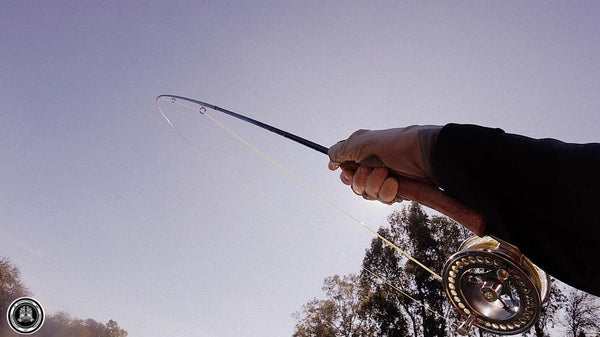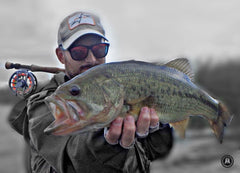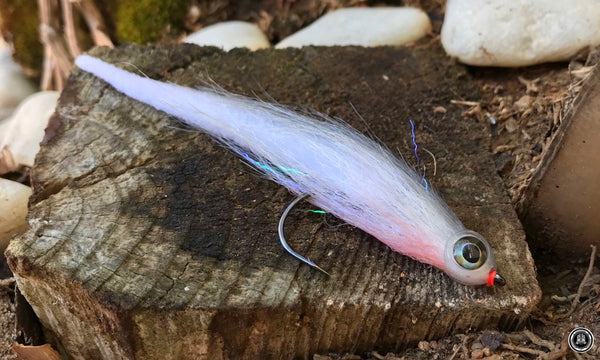Fly Selection: How to Choose the Right Streamer Color for Any Fishing Situation
How Do You Decide Which Streamer Color to Fish With?
Choosing the right color for your streamers based on the kind of water, depth, and brightness of the day is quite important in fly fishing.
Like many casting or spinning anglers do with their lures, we must tie our fly patterns using different combinations of colors because the flies don't look the same when they're underwater depending on the weather, water color, and depth.
For instance, a streamer with a lot of bright colors is ideal for sunny days because of the flashes produced by the sun, but isn't effective for dark days. This concept is not only useful for streamer fishing but for nymphing as well.
Let's Talk About the Weather
Sunny Days
Golden and silver colors are the best option for fly fishing during sunny days. The sunlight reflects on them and produces flashes that attract the attention of fish. In contrast, on cloudy days these gold and silver streamers will be practically invisible.
Cloudy Days
UV light is especially powerful during cloudy days, so fluorescent and bright colors are essential for predatory fish to notice your streamers.
Types of Water
The next important factor is the tone of the water.
Transparent Water
Mask Jerky tied with a Fish-Skull Fish-Mask and Living Eyes.
Streamers with mostly natural colors are ideal for transparent water. Fish will be able to see the imitation perfectly, so it should resemble the baitfish that they usually hunt as much as possible. Brown, gray, olive, and white colors would be some of the best options.
Green Water

They love the Fish-Skull Fish-Mask.
Streamers with two tones — one more natural, and another colorful — will increase your streamer fishing success in green water. This streamer color combination allows the fish to detect your fly without causing rejections. An example would be a chartreuse and white fly.
Brown Water
Living Eyes finish off this Game Changer fly pattern tied on the Fish-Skull Articulated Fish-Spine system.
Streamers tied with bright colors as well as especially dark or black colors will get the most attention when fishing in brown water. This is the situation in which fire tiger fly patterns show their maximum potential.
Fly Selection and Speed of Current
These conditions are also ideal for articulated patterns which produce good vibrations and movement because fish will use more of their lateral line senses than of their vision to locate and attack prey. A good option would be to use a colorful Game Changer fly.
Fly Colors, Depth, and Light Absorption

The last factor would be the visibility of each color depending on the depth due to the absorption of the color.
Due to the grade of light penetration and ultra-violet wavelength, clear colors, such as white, will look gray or bluish and the darkness of this appearance boosts rapidly as it goes deeper. It will be the same for red colors which will look to be darker (dark brown or black) within a few meters of the surface. In very deep water, regardless water color or tone, there will be a great deal of gray, blue, or black shades.
Temperate Bass Flies: How to Diversify Your Fly Box
Its very important to know because, for example, if we want to fish deeper we should not use a streamer in which red predominates since it will not be seen because its visibility range goes from 0 m to 6 m. Thus, using them at 10 m depth would be like fishing with an invisible streamer.
Regarding horizontal distance, it's exactly the same. Color perception will be the same at 5 m both in horizontal, diagonal, and vertical separation.
Let's analyze each color as it applies to your fly and the depth of the water:
Reddish
They should be used in the first layers of water. Quickly lose their visibility range from 0 m to 6 m. Even much more in turbid water
Orange/Yellow
Visibility range from 0 m to 10 m.
Greenish
These colors are visible from 0 m to 20 m.
Blues
Visible from 0 m to 27 m.
Blacks
The most visible of all. They do not lose their visibility even below 30 m depth.
Fly Tying: There's No New Black
Fill up Your Fly Box and Go Fishing!

Hopefully this information will help you with your streamer selection and increase your fishing success. You can also add rattles to produce more vibrations and then fish can locate them through their lateral line.
Make Some Noise! How To Tie Loud Flies for Esox Fishing
Also, don't forget that these concepts are applicable when fishing with nymphs.
Want More Content Like This?
Join the Flymen Mailing List at the Bottom Right of the Page!
About Jorge Garcia Huertes:








Always interesting to review basic facts from a new voice.
Trying to overlook that fact that your intro says bright colors are not effective on dark days, then the Cloudy Days section says bright colors are essential to have your streamer noticed. ??? The color absorption section is interesting — not familiar with that factor. Since I fish rivers for trout and cast to structure, I don’t need a fish to see the fly more than maybe 10 or 15 feet away, the light absorption issue isn’t much of a concern. Still, it’s interesting — but I’d like to know where that info came from so I could read more.
Nice article, however, I found it a little hard to under stand because everything was in meters and I don’t use meters, I use feet. Don’t know 10 m, 20m equal in feet. For us in US you should feet not meters.
This for some is very difficult to understand because it’s counter-intuitive. Very well done article. Makes it easy to understand.
Please add me to your list.
Thank you
Leave a comment